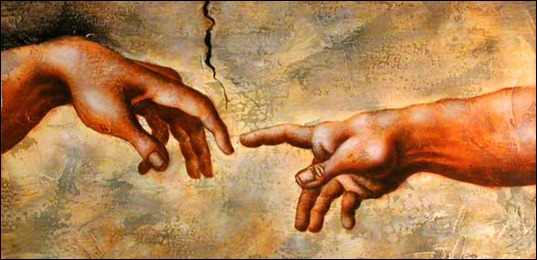Let me give you a hand Posted by Geoff on Aug 20, 2013 in Italian Language
Mano = hand, like occhio = eye, which we explored in a previous blog, is another word whose roots can be found in a range of vocabulary and expressions which I’ll cover in this blog. But first, let’s have a look at the hand itself. The first thing to note is that la mano is irregular in that it is a feminine word ending in ‘o’, which is typically a masculine ending:
la mano = the hand (fem. sing), plural le mani
Here are the basic parts of the hand:
il dito = the finger (masc. sing.), plural le dita (fem. plur.)
il pollice = the thumb
l’indice = the index finger
il medio = the middle finger
l’anulare = the ring finger
il mignolo = the little finger
la nocca = the knuckle
l’unghia = the nail (fem. sing.)
il palmo = the palm
il dorso = the back of the hand
 |
| Hands from Michelangelo’s La Creazione di Adamo |
Here are a few words which derive from mano, beginning with a sometimes controversial one:
manager = manager, contrary to a misguided theory proposed by certain feminists the word manager (we use the word in its English form) has nothing to do with men, i.e. man (male person) ager. It derives instead from the Latin manu agere = to lead by the hand
manuale = manual, literally: ‘by hand’, or handbook, as in manuale di istruzione or manuale d’uso (instruction manual). N.B. Libretto di istruzione (instruction booklet) is also widely used
manodopera = labour, literally: ‘handwork’ (can also be written mano d’opera but the former is more correct). Hence manodopera stagionale (seasonal labour), costo della manodepera (labour cost), etc.
manovale = labourer
manovra = manoeuvre, literally: ‘operation carried out by hand’ (the English word manure also comes from the same root)
manufatto = manufactured product, artefact, handwork, literally: ‘made by hand’, hence manifattura = manufacturing
maneggiare = to handle
il manico/la maniglia = the handle, such as a door handle: la maniglia della porta
la manovella = the crank
la manopola = the knob
la manica = the sleeve, N.B. we also use La Manica to describe ‘The English Channel’
la manica a vento = the windsock, literally: ‘the wind sleeve’
le manette = the handcuffs
… and a few useful expressions that use the word mano:
a portata di mano = close at hand, hence: tenere a portata di mano (keep close at hand)
mani di pasta frolla = butter fingers, literally: ‘short crust pastry hands’
fare la mano morta = to touch someone (with sexual intent) by pretending it was an accident, literally: ‘to do the dead hand’
dare una mano = to give a hand, e.g. domani ti do una mano sull’orto (I’ll give you a hand in the vegetable garden tomorrow), or le posso dare una mano, signora? (can I give you a hand madam?).
stringere la mano a qualcuno = to shake someone’s hand, literally: ‘to squeeze the hand’
una persona alla mano = a simple person
scritto/composto a quattro mani = co-written, literally: written/composed by four hands (i.e. by two people)
una mano lava l’altra e tutt’e due lavano il viso = cooperation is more effective, literally: one hand washes the other one and both wash the face

Build vocabulary, practice pronunciation, and more with Transparent Language Online. Available anytime, anywhere, on any device.




Leave a comment: